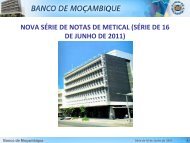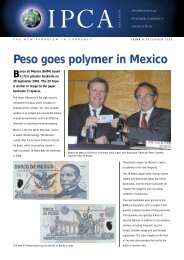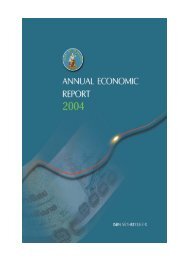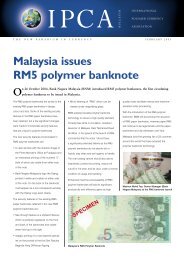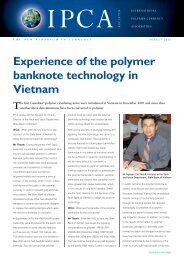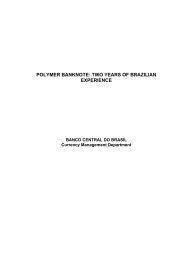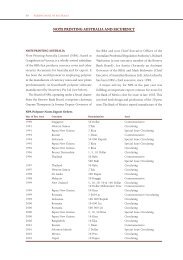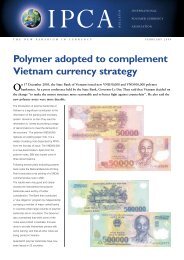ANNUAL REPORT 2008 - Polymer Bank Notes of the World
ANNUAL REPORT 2008 - Polymer Bank Notes of the World
ANNUAL REPORT 2008 - Polymer Bank Notes of the World
You also want an ePaper? Increase the reach of your titles
YUMPU automatically turns print PDFs into web optimized ePapers that Google loves.
for financial institutions, to facilitate <strong>the</strong> funding<strong>of</strong> banks, to provide financial institutionswith additional capital resources, to allowfor <strong>the</strong> efficient recapitalisation <strong>of</strong> distressedbanks and to ensure sufficient flexibility in <strong>the</strong>implementation <strong>of</strong> accounting rules. In addition,a financial crisis cell was established to facilitaterapid and effective action in a crisis situation.This cell brings toge<strong>the</strong>r representatives <strong>of</strong> <strong>the</strong>country holding <strong>the</strong> EU presidency, <strong>the</strong> President<strong>of</strong> <strong>the</strong> European Commission, <strong>the</strong> President <strong>of</strong><strong>the</strong> ECB (in conjunction with o<strong>the</strong>r EU centralbanks), <strong>the</strong> President <strong>of</strong> <strong>the</strong> Eurogroup and <strong>the</strong>governments <strong>of</strong> <strong>the</strong> Member States.OTHER EU POLICIESThe ECB monitored developments in <strong>the</strong> field<strong>of</strong> EU climate change and energy policies, inview <strong>of</strong> <strong>the</strong>ir potential impact on macroeconomicdevelopments, price stability and fiscal positions.As regards energy policies, improving <strong>the</strong>functioning <strong>of</strong> <strong>the</strong> EU’s internal market forenergy can be expected to have a positive impacton energy price developments and to enhance<strong>the</strong> predictability <strong>of</strong> energy supply. In bothpolicy fields, <strong>the</strong> focus during <strong>2008</strong> was onturning <strong>the</strong> EU’s ambitious commitments intolegislation. 2 The ECB also monitoreddevelopments in <strong>the</strong> Common AgriculturalPolicy (CAP), in particular as regards <strong>the</strong>irimpact on food prices. In response to <strong>the</strong> surgein food prices, <strong>the</strong> EU Council agreed on severalmeasures to improve food supply, such as <strong>the</strong>sale <strong>of</strong> public stocks, <strong>the</strong> suspension <strong>of</strong> <strong>the</strong>obligation for farmers to leave some <strong>of</strong> <strong>the</strong>irarable land uncultivated, an increase in milkquotas and <strong>the</strong> suspension <strong>of</strong> import duties forcereals. Following <strong>the</strong> launch <strong>of</strong> <strong>the</strong> “CAPHealth Check” by <strong>the</strong> Commission, <strong>the</strong> EUCouncil reached an agreement in November<strong>2008</strong> to modernise and streamline <strong>the</strong> CAP andto remove remaining restrictions on farmers inresponse to <strong>the</strong> growing demand for food.2 According to <strong>the</strong> climate and energy legislative package, <strong>the</strong>EU should, by 2020, reduce greenhouse gas emissions by 20%compared with 1990 and increase <strong>the</strong> use <strong>of</strong> renewable energysources to 20% <strong>of</strong> overall EU energy consumption. Moreover, itshould increase energy efficiency by 20%.Box 12TEN YEARS OF EMU<strong>2008</strong> marked <strong>the</strong> tenth anniversary <strong>of</strong> <strong>the</strong> ECB and <strong>of</strong> <strong>the</strong> Eurosystem and <strong>the</strong> ESCB. Thisanniversary provided an opportunity to review <strong>the</strong> first decade <strong>of</strong> EMU and to draw lessons from<strong>the</strong> experience gained during this period.In May <strong>2008</strong> <strong>the</strong> ECB published a special edition <strong>of</strong> <strong>the</strong> Monthly Bulletin, which gave anaccount <strong>of</strong> <strong>the</strong> Eurosystem’s work and achievements and looked at <strong>the</strong> challenges that <strong>the</strong>Eurosystem and <strong>the</strong> euro area face as <strong>the</strong>y enter <strong>the</strong>ir second decade. The first ten years <strong>of</strong> EMUhave demonstrated <strong>the</strong> ECB’s ability to fully live up to its Treaty mandate. In spite <strong>of</strong> a difficultexternal environment, characterised by a significant increase in commodity prices, price stabilityhas been broadly achieved. In <strong>the</strong> euro area, consumer prices rose, on average, at an annual rate <strong>of</strong>2.1% between 1999 and 2007, well below average annual consumer price inflation in <strong>the</strong> periodfrom 1990 to 1998, which amounted to 3%. Moreover, <strong>the</strong> ECB has succeeded in anchoringlonger-term inflation expectations at levels consistent with price stability. EMU has also fosteredemployment creation. Employment in <strong>the</strong> euro area rose by around 16 million persons between1999 and 2007, as compared with around 6 million persons in <strong>the</strong> period 1990-98.The European Commission published a communication in May, toge<strong>the</strong>r with a report entitled“EMU@10: successes and challenges after 10 years <strong>of</strong> Economic and Monetary Union”, in174 ECBAnnual Report<strong>2008</strong>



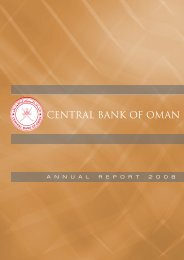
![KNOW YOUR NEW GIBRALTAR BANKNOTES - [Home] bThe/b](https://img.yumpu.com/50890985/1/184x260/know-your-new-gibraltar-banknotes-home-bthe-b.jpg?quality=85)
![PAPUA NEW GUINEA - [Home] - Polymer Bank Notes of the World](https://img.yumpu.com/49758743/1/190x143/papua-new-guinea-home-polymer-bank-notes-of-the-world.jpg?quality=85)

